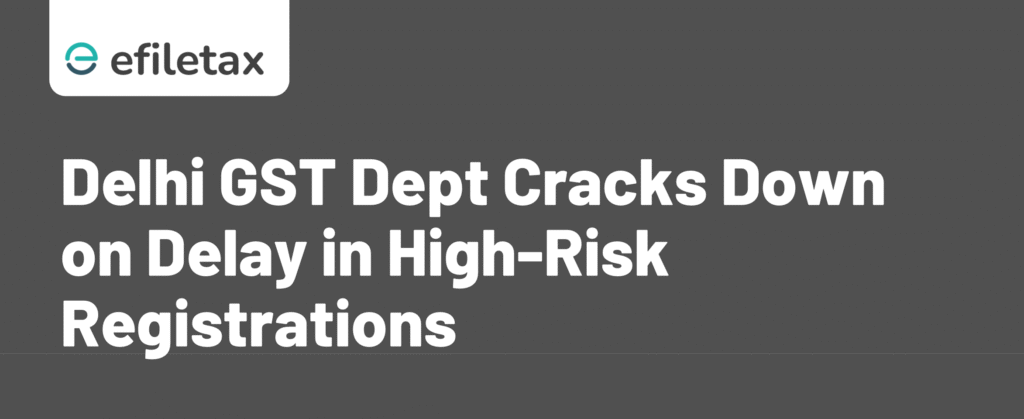
Delhi GST Tightens Rules on High-Risk Registrations
The Delhi GST Department has made timely verification of high-risk GST registration applications mandatory, warning officials against citing “jurisdictional mismatch” as an excuse for delay. This move aims to curb fake firms, improve compliance, and prevent revenue leakage.
Why This Matters
Delhi has seen a surge in high-risk GST registrations, especially post-pandemic, often linked to fake invoicing rackets and ITC fraud. To address this, the department has:
- Flagged high-risk applicants using automated data analytics
- Emphasised time-bound physical verification under Rule 9(1) of CGST Rules
- Ordered strict disciplinary action against officers delaying verification or shifting responsibility
What Is a High-Risk GST Registration?
A high-risk registration is typically one where:
- PAN or Aadhaar mismatch exists
- Suspicious IP or geolocation data is flagged
- Applicant has prior history of cancellation
- Non-existent business premises are suspected
Legal Basis for Action
The directive is rooted in:
- Rule 9 of the CGST Rules, 2017: Requires timely verification (within 7 working days) for applications flagged for physical verification
- Circular No. 95/14/2019-GST: Clarifies timelines and responsibilities for GST officers
- Section 25 of the CGST Act: Governs registration and verification procedures
What Officers Must Do
GST officers in Delhi must:
- Complete verification of flagged applications within the statutory timeline
- Conduct on-ground verification even if jurisdiction seems unclear
- Submit verification reports to the Control Room team in real time
- Avoid “back-and-forth shifting” of files between circles or zones
Failure to comply can invite disciplinary action, including memo and vigilance inquiry.
Efiletax Insight: A Practical Tip
Startups and new applicants must ensure:
- Their principal place of business is accurate and verifiable
- They keep lease deeds, electricity bills, and board photos ready for physical verification
Small errors often lead to registration rejection or fraud suspicion, especially under heightened scrutiny.
Impact on Businesses and Consultants
- Faster rejections if documents are not ready or premises are unverifiable
- Higher scrutiny for shared co-working spaces or residential registrations
- Consultants need to prepare clients in advance to avoid verification delays
High-Risk Verification: Step-by-Step Timeline
| Stage | Action | Deadline |
|---|---|---|
| Application Filed | High-risk flags raised by GSTN | Real-time |
| Officer Assigned | Verification order sent | Same day |
| Physical Visit | Site verification conducted | Within 7 working days |
| Report Uploaded | Final verification uploaded to GST portal | Immediate |
| Registration Approved/Rejected | Based on verification | Within 15 days of application |
FAQs
Q1. Can jurisdiction mismatch delay verification?
No. Delhi GST has clearly stated that jurisdiction is not a valid excuse for delays in high-risk verification.
Q2. What documents should I keep ready?
Valid address proof (rent agreement/EB bill), PAN, Aadhaar, shop photo with name board, and business activity proof.
Q3. What if verification is delayed by the officer?
The officer may face disciplinary action, but your registration may also get rejected automatically under Rule 9(4).
Final Word
Delhi’s move on timely verification of high-risk GST registrations is a strong step to cleanse the system of fake entities. For genuine businesses, compliance now starts even before registration—get your documents right and premises ready.
Need help with GST registration, physical verification prep, or high-risk cases?
Reach out to Efiletax – India’s trusted GST filing partner.
Summary
Delhi GST has mandated time-bound verification of high-risk GST registration applications. Officers cannot delay on grounds of jurisdiction. Businesses must ensure documents and premises are ready, or risk rejection. Efiletax can help with smooth, compliant GST registration under the new verification rules.